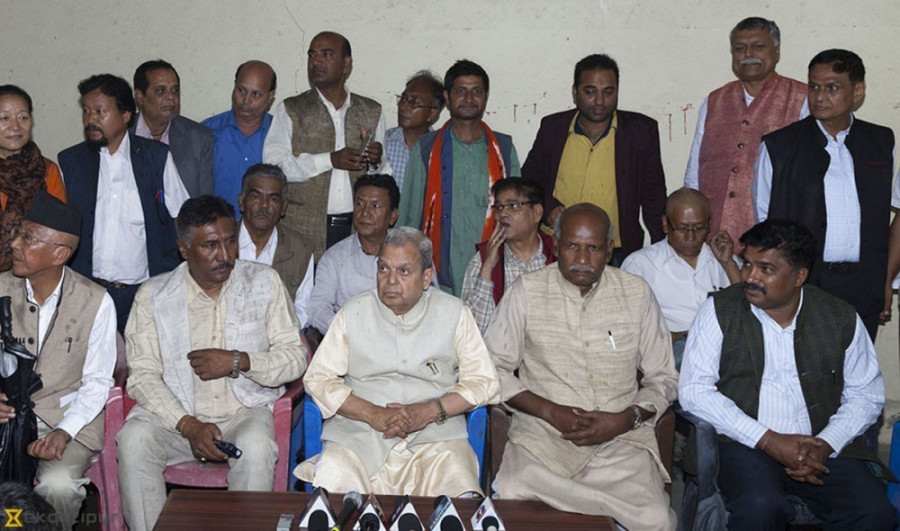Politics
Divisions appear in the Janata Party over whether or not to join government
Four leaders from the Janata Party’s six-member presidium are in favour of joining the Oli administration while two are against, party insiders says.
Tika R Pradhan
The Rastriya Janata Party Nepal, which had been backing the KP Sharma Oli government since February 2018, suddenly turned hostile to the governing Nepal Communist Party in March last year after a district court handed a life term to its lawmaker Resham Chaudhary.
The party withdrew its support to the government, saying the Nepal Communist Party (NCP) had failed to uphold a deal reached between the two parties to keep Chaudhary out of jail. Chaudhary was convicted of masterminding the August 2015 Kailali violence, in which nine people were killed.
The Janata Party then started demanding constitutional amendments and the withdrawal of “false cases” against its members. It was even planning to form an alliance with “like-minded forces”, including the Samajbadi Party, to launch protests for constitutional amendments. Talks were ongoing for a merger between the Janata Party and Samajbadi Party Nepal, which together have 33 seats in the lower house—16 for the Janata Party and 17 for the Samajbadi Party—of the federal parliament. The Janata Party, however, had insisted that the Samajbadi Party quit government before a merger could take place.
But in the third week of December, days before the Samajbadi Party quit the government, the Janata Party forged an electoral alliance with the Nepal Communist Party for the National Assembly election, which was held on Thursday.
Three days ago, when the communist party fielded Agni Sapkota for Speaker, Janata Party stood in support, which was seen as a precursor to the party’s joining the government. This has created a rift in the party.
The party’s senior vice-chair, Sarbendra Nath Shukla said that some leaders in the six-member presidium had held meetings, at least three, with the ruling party leadership to decide on candidates for the National Assembly election. He did not rule out a deal that the leaders might have reached with the ruling party on joining the government.
“A large number of party leaders are against joining the Oli government, largely because the prime minister has shown no signs of addressing our demands for constitutional amendments,” Shukla told the Post.
On Tuesday, five senior leaders from the Janata Party handed over a memorandum to party coordinator Mahendra Yadav, accusing the six-member presidium of hobnobbing with the ruling party leadership in a bid to join the government.
Multiple politicians that the Post spoke to said at least four leaders from the presidium are in a bid to join the government while two are opposed. There are now concerns that the four leaders could push through a decision on joining the government.
“Mahendra Yadav has insisted that the party should not join the government unless the constitution is amended,” said JP Yadav, the party general secretary.
Within the ruling party too, there are two distinct lines. Oli is in favour of inducting the Janata Party into government in a bid to ensure a two-thirds majority, which he lost after the Samajbadi Party quit. But Co-chair Pushpa Kamal Dahal, who has suddenly appeared stronger since extracting the Speaker post for the Maoist faction, is not too keen on bringing in the Janata Party.
In all the manoeuvrings inside the ruling party, Janata Party finds itself in a fix.
Some leaders fear that by siding with the ruling party, they run the risk of their demands not getting addressed. But others believe the party could finally make Oli address their demands.
The bonhomie between the Janata Party and the ruling party has also started to cause concern in the Samajbadi Party.
The Janata Party and Samajbadi Party have a coalition government in Province 2, the only province where the Nepal Communist Party does not rule.
All four candidates from the NCP-Janata Party alliance won from Province 2 in the National Assembly election on Thursday, a sign of the strengthening bond between the two parties.
Rajendra Shrestha, co-chair of the Samajbadi Party, said that if the Janata Party decides to join the government, its leaders will lose face in the Madhes.
“Then, we will also have to think of their persistent calls for forming an alliance or unite as a farce,” Shrestha told the Post.
Political commentators said the issue is now far bigger than some demands and concerns—it’s about the moral compass of leaders from both Janata Party and Samajbadi Party. The two Madhes-based parties, which should have been jointly demanding constitutional amendments, are instead in a blame game and in a race of getting closer to the government.
“When people elected them to the federal Parliament, the mandate was not to join the government,” said Chandrakishore, a commentator and Madhes-based journalist. “If the Janata Party joins government, it will further lose its moral capital. People voted for the party so that it could fight to ensure constitutional amendment, inclusion and meaningful federalism.”




 10.55°C Kathmandu
10.55°C Kathmandu














